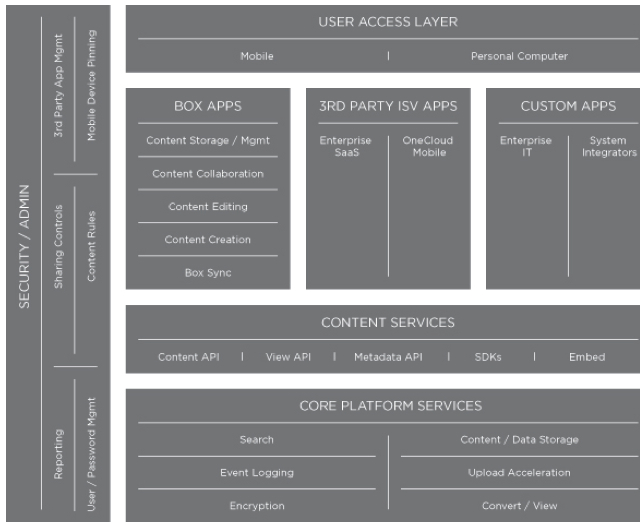Box Files for IPO
But no profit in foreseeable future
By Corentin Béchade | March 28, 2014 at 2:57 pmIn the over-saturated market of cloud storage, Box is one of the few brand names that rises above the crowd.
Along with big names like Microsoft, Google or Amazon, the company has managed to made a name for itself and appear as a viable competitor. But even for the few that comes out ahead, the cloud storage market is a tough one and unlike the big brands, Box does not have a suite of products to capitalize on to find revenue streams. Its entire business model is freemium-based.
Major elements of Box platform
For its IPO launched on Monday, March 24, the company unveiled numbers showing that striving in this business is no easy task.
Box beat Dropbox to the stock exchange market because the company needed money. While Box doubled its revenue to 124.1 millions for the year ending last January 31, losses reached as much as $168.6 million in the last fiscal year. Box is a prime example of a rapidly growing yet unprofitable start-up. As of January 31, 2014, the firm had an accumulated deficit of $361 million.
And the IPO filings read: “We do not expect to be profitable for the foreseeable future.“
$171 million was spent last year on sales and marketing alone. In such a competitive market Box dedication to brand awareness is both an asset and a risk taking into account that the amount of money spent is superior to the revenue of the year.
The total number of employee rose from 369 to 972 in a year with 513 working in sales.
The company now has 25 millions registered users and 225,000 corporate users. But only 7% of users are using a paid plan. Box business focused on corporate users, and according to the company, 40% of the Fortune 500 are using its service. This is where Box found something valuable, while end-users are more keen to rely on free services, corporation are more willing to put the price for a supported cloud services.
But it also has to face another issue regarding data security. Indeed big businesses often have stringent security rules and some of them are not thrilled with the idea of offloading their sensitive documents to a third-party remote server. Box does have a pretty good track record concerning security but it doesn’t hold the comparison versus an enterprise network tailored to the business needs. We’ve seen company using Dropbox, Drive or other cloud services without taking into account the problems concerning data ownership and what can happen in case of downtime or even worse shutdown. Box doesn’t have the controversial reputation of a MegaUpload but it’s still afflicted with the typical issues concerning cloud storage. For a company that draws most of its revenue stream from corporate users, scaling and investing in the security is essential.
Big customers include Ameriprise Financial, Inc., Bechtel, Eli Lilly and Company, Gap, Inc., Schneider Electric and Sunbelt Rentals.
Customers’ data are stored in two third-party datacenter hosting facilities located in Northern California and replicated in near real time in a facility located in Las Vegas, NV.
Channel partners include Ingram Micro, CDW, Insight Direct, SoftChoice, AT&T and SHI International Corp. Box also entered into agreements with the intent to either market, resell, integrate with or endorse its service, or a combination of these activities, that will benefit to customers. Current partners include Deutsche Telekom, DocuSign, Good Technology, MobileIron, NetSuite, Okta and salesforce.com.
Box has four issued U.S. patents, one issued Great Britain patent and more than 140 pending patent applications.
It’s not easy to kown how much Box raised in financial funding since inception in 2005. According to our calculation, it’s $404.5 million including $129 million in 2010, $150 million in 2012 and $100 million in 2013.
The start-up realized only one acquisition, Crocodoc, Inc., a privately-held company which provides HTML5 document rendering and viewing solutions to enterprise customers, for $13 million.
Only 29, Aaron Levie, co-founder, chairman and CEO, received in FY13 total compensation of more than $2 billion.
Prior of IPO, main shareholders were entities affiliated with Draper Fisher Jurvetson with a 24% ownership, Levie himself owning 4%.
The Los Gatos, CA firm hopes to raise up to $250 million in its IPO on the New York Stock Exchange, a relatively small amount compared to the $400 million+ already invested in the company..
Financial results in $ million
| Fiscal Year | 2011 | 2013 | 2014 |
| Revenue | 21.1 | 58.8 | 124.2 |
| Y/Y Growth | NA | 179% | 111% |
| Net Income (loss) | (50.3) | (112.6) | (168.6) |
Box changed the end of its fiscal year effective for the year ended January 31, 2013.
The fiscal year 2011 ended December 31. 2013 and 2014 ended January, 31.
Comments
This IPO is done at the worst time for Box as Google more recently slashes drastically the prices of its online backup service. Google Drive announced 15GB for free, and 1TB at $10/month as an example. For Box, it's only 10GB for free and $15/month for 1TB.
The financial figures of Box prove that most of off-site backup firms are losing money in a highly competitive market with more than 2,000 companies worldwide in this business. And the last move from Google is not going to improve their situation.













 Subscribe to our free daily newsletter
Subscribe to our free daily newsletter

